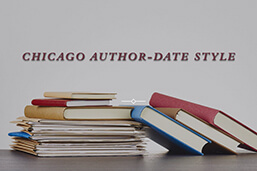
The Chicago author-date style highlights sources in academic papers formatted according the Chicago style guide. The Chicago author-date style contains the author of a source and the publishing date to navigate readers to the original source. Referencing the Chicago author-date style helps prevent plagiarism by acknowledging the original creator of cited works in a research publication. This article thoroughly outlines how to format the Chicago author-date style correctly with examples.
Regarding the Chicago author-date style, the notes and bibliography method are the prescribed format for citing sources. Social sciences mainly use the Chicago author-date style for general formatting. Thus, this style is recommended by most universities and research institutions. Chicago author-date style consists of in-text citations, including the author’s name, year of publication, and if necessary, the page number.
Sources within the text are cited using brackets in Chicago author-date style. The citation begins with the name of the author’s last name followed by the publication year without any punctuations to separate them.
Placement of in-text citations
The citation in Chicago author-date style is placed at the end of the cited clause.
The reference list outlines further details on the sources included in the Chicago author-date style citations. Individual entries on the reference start with the author’s last name and the date of publication.
Formatting entries on the reference list may vary according to the type of source. Some common examples of citations include:
Book citation
In Chicago, author-date style book citations:
Format: Author last name, first name. Year. Title of Book. Edition. Place of publication: Publisher. URL.
Book chapter citation
Format: Author last name, first name. Year. “Title of Chapter.” In Title of Book, edited by Editor first name last name, page range. Place of publication: Publisher.
Journal article citation
Journals usually have volume and issue numbers as they are released periodically, which should be indicated in the Chicago author-date style.
Format: Author last name, first name. Year. “Title of Article.” Name of Journal, Volume, Issue number (Publication date): Page range. DOI or URL.
Website citation
Using the Chicago author-date style to cite online articles and webpages:
Format: Last name of the author, first name. Year. “Title of Page.” Name of Website. Access/revision date. URL.
E-book citation
Using the Chicago author-date style to cite E-books:
Format: First name, Last name, Book Title (City: Publisher, year published), page or location number, URL.
Newspaper or magazine citation
Cite newspapers as follows:
Format: Last name, First Name. “Title of Article.” Newspaper Title. Month Day, Year. Url (Month Day, Year).
Interview citation
Interviews can be cited as follows:
Format: Name, Interview by, Location, Date
Thesis or dissertation citation
When citing a thesis format in Chicago author-date style, your citation should be as follows:
Format: First-name Last-name, “Thesis Title: Subtitle,” (Publisher, Year).
Social media content citation
Social media content is cited as follows:
Format: Lastname, Firstname [or single username] (@handle). Year. “Full Tweet.” Twitter, Month day, year, time posted. URL.
Personal communication citation
Researchers may use personal communication like phone calls as references. These can be formatted as follows:
Format: Name, in discussion with, date.
There are other Chicago author-date style variations in unique cases when citing sources. They include:
Citing a source with multiple authors
Where there is more than one author:
| 2 authors: | (Dreyfus and Grealish 2019) |
| 3 authors: | (Barker, Davidson, and Riley 2013) |
| 4 authors or more: | (Levine et al. 2012) |
| More than 11 authors: | mention the first seven on the reference page, followed by “et al.” |
Citing multiple sources with the same author and year
Cite such sources using the Chicago author-date style, which lists the sources in alphabetical order to distinguish each reference. Include a letter after publication, i.e., a, b, c…
Citing sources with missing information
Sources with missing information can also be cited using the Chicago author-date style. If you have a source with no publication date, use the abbreviation “n.d.” i.e., “no date” in the reference list.:
| In-text citation: | (Rowe n.d.) |
| Reference list entry: | Rowe, Bryant. n.d. Birds of Prey: Los Angeles: Wiley. |
| For sources without author names: | Some sources may not have author names, mention the organisation ’s name. |
FAQs
Chicago author-date style is the format of referencing used in Chicago-style academic papers. It includes the author’s name and the date of publication.
Harvard style and Chicago author-date style are formatting styles used in academia. However, they are different as they use different rules to cite sources used in research.
This style of referencing is used in Chicago-formatted academic papers. It is used by researchers for in-text citations and reference lists.
You can mention the name of the organisation associated with the publication. Sources with no known authors include organisation publications and government releases.
